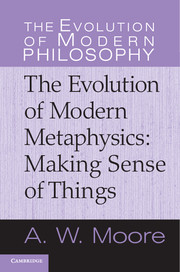Book contents
- Frontmatter
- Contents
- Preface
- Introduction
- Part One The Early Modern Period
- Part Two The Late Modern Period I
- Chapter 8 Frege
- Chapter 9 The Early Wittgenstein
- Chapter 10 The Later Wittgenstein
- Chapter 11 Carnap
- Chapter 12 Quine
- Chapter 13 Lewis
- Chapter 14 Dummett
- Part Three The Late Modern Period II
- Bibliography
- Index
Chapter 13 - Lewis
Metaphysics in the Service of Philosophy
from Part Two - The Late Modern Period I
Published online by Cambridge University Press: 05 June 2012
- Frontmatter
- Contents
- Preface
- Introduction
- Part One The Early Modern Period
- Part Two The Late Modern Period I
- Chapter 8 Frege
- Chapter 9 The Early Wittgenstein
- Chapter 10 The Later Wittgenstein
- Chapter 11 Carnap
- Chapter 12 Quine
- Chapter 13 Lewis
- Chapter 14 Dummett
- Part Three The Late Modern Period II
- Bibliography
- Index
Summary
Analytic Philosophy in the Immediate Aftermath of Quine
Quine changed the map of analytic philosophy. Or perhaps the perfect tense better captures the dynamic: Quine has changed the map of analytic philosophy. To be sure, his influence, like that of any great philosopher, has been marked no less by rebellion among his successors than by discipleship. Thus many of his specific proposals about meaning, to take one central example, have been subjected to sustained counterargument, but only because they have first been subjected to sustained scrutiny. And even when philosophers who have disagreed with him have not been particularly concerned to justify their disagreement, they have felt obliged to register it. It would be out of the question, now, for an analytic philosopher to make pivotal but uncritical use of the analytic/synthetic distinction, something that was commonplace before Quine’s onslaught.
David Lewis (1941–2001) was a student of Quine’s. As well as being an extraordinarily engaging thinker in his own right, he is also an especially interesting representative of post-Quinean analytic philosophy. On the one hand, he epitomizes the naturalistic spirit that has dominated analytic philosophy since the middle of the twentieth century and that Quine did so much to propagate. On the other hand, he epitomizes one of the most signal features of analytic philosophy’s more immediate past: a resurgence of the kind of mainstream metaphysics that was practised in the early modern period; a resurgence, that is, of armchair reflection on such topics as substance, identity, necessity, causation, time, space, freedom, and the relation between mind and body.
- Type
- Chapter
- Information
- The Evolution of Modern MetaphysicsMaking Sense of Things, pp. 329 - 344Publisher: Cambridge University PressPrint publication year: 2011

